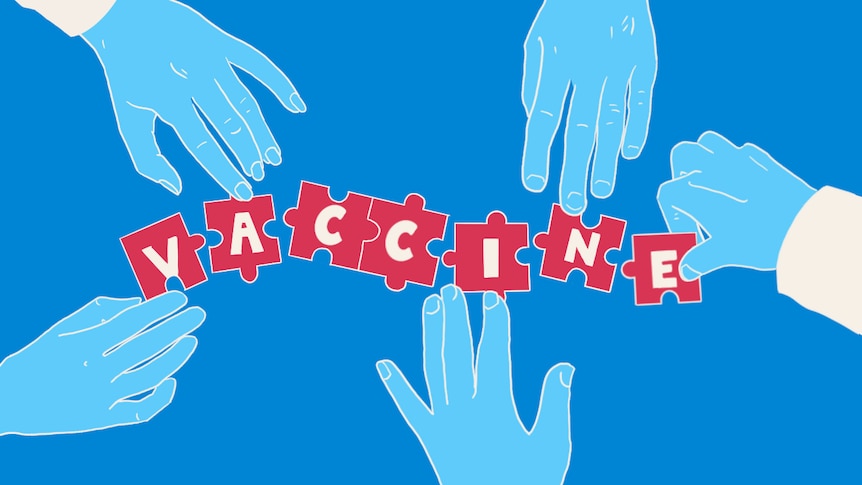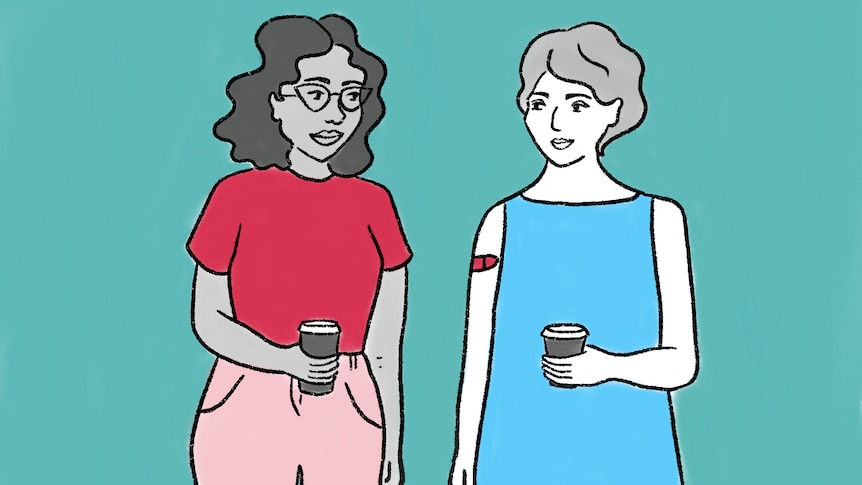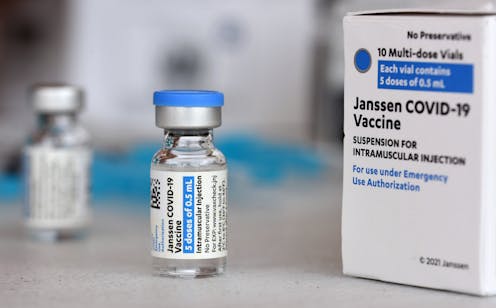How might the AstraZeneca COVID-19 vaccine cause blood clots? We ask the experts
ABC Health & Wellbeing
/
By health reporter
Lauren Roberts
Posted 8hhours ago
AstraZeneca's phase three clinical trials involved 32,459 participants: roughly 20,000 of whom received the vaccine.(
Getty Images: Vincenzo Izzo/LightRocket
)
Share
The AstraZeneca COVID-19 vaccine has been identified as the likely cause of more than 100 very rare, potentially deadly blood clots.
Key points:
- In very rare cases, some people develop a blood clot after vaccination with the AstraZeneca vaccine
- Experts don't know if the immune reaction that causes these clots is due to the adenovirus component in the vaccine
- It's also not clear why more younger women have presented with these clots
This conclusion,
drawn by regulators in Australia, led to an overhaul of the national vaccine rollout program.
In early April, Australian health authorities estimated these rare clots affected roughly five people in every 1 million AstraZeneca vaccine recipients.
Roughly one in four people who developed a clot later died.
Most of the first reported cases involve a clot in the brain called cerebral venous sinus thrombosis (CVST), although some clots present in other parts of the body.
University of Western Australia haematologist Matthew Linden described the clotting response as "completely unexpected".
"We learn a lot more with every new case, but thankfully, every new case is very rare," he said.
These rare clots are also associated with low levels of a type of blood cell called platelets, which UNSW haematology senior researcher Jose Perdomo described as unusual.
"Most conditions with thrombosis don't show low platelets," he said.
But how can a vaccine — in very rare cases — result in a blood clot?
And why wasn't it picked up in clinical trials?
Here's what the science tells us so far.
Space to play or pause, M to mute, left and right arrows to seek, up and down arrows for volume.
WATCH
Duration: 1 minute 21 seconds1m 21s
PM says there are 'strong arguments' for opening vaccinations to over 50s with AstraZeneca supply
No rare clots in clinical trials
These rare clots were not picked up in clinical trials because of sample size, RMIT University professor of immunology Magdalena Plebanski said.
Got questions about the COVID vaccines? We have answers

Confused about Australia's vaccine rollout? We've tracked down the answers to the questions you've been asking.
Read more
AstraZeneca's
phase three clinical trials involved 32,459 participants: roughly 20,000 of whom received the vaccine, with the remainder given a placebo.
"There will be things that get picked up when you start testing millions of people, rather than thousands," Professor Plebanski said.
Experts must also weigh up whether a reaction observed post-vaccination is caused by the vaccine, or is unrelated to it.
But the timing of these rare clots — which appear roughly four to 28 days post-vaccination – plus similarities to a rare
autoimmune syndrome called heparin-induced thrombocytopenia, led Professor Plebanski to agree it was "likely" to be a cause and effect relationship between the AstraZeneca vaccine and this condition.
Keep up to date with the latest news on the pandemic with the ABC's coronavirus pageHow can AstraZeneca cause blood clots?
We don't know for sure, but, as Dr Linden explained,
experts have a few theories which are backed by evidence.
"There's some good data to suggest [the AstraZeneca vaccine] is creating an inappropriate immune reaction against a protein that's found in blood platelets called platelet factor 4," he said.
Platelet factor 4, or PF4, allows blood cells to communicate with each other.
Normally, our immune system recognises PF4 as nothing to worry about, but in the case of
heparin-induced thrombocytopenia, the body mounts an immune response against PF4.
Dr Linden said a similar immune response had been noted in people who, after being vaccinated with AstraZeneca, developed these rare clots.
"Antibodies against platelet factor 4, which we normally see in only about 4 per cent of the population, are present in all but one of the cases [of rare blood clots] which have been investigated to date," Dr Linden said.
The immune reaction causes platelets that make PF4 to clump together and get destroyed.
During this process, platelets release all their proteins into the bloodstream (including the one causing the immune reaction), causing symptoms to escalate.
Dr Perdomo said researchers don't yet know why this has happened in some people after getting the AstraZeneca vaccine.
"It's very hard to think of a link between these type of vaccinations and antibodies against platelet factor 4," he said.
Vivien Chen, a haematologist with a focus in coagulation disorders at the University of Sydney, added: "This [immune reaction] gives us a potential pathophysiological link, but it looks like it won't be the whole story."
AstraZeneca is a viral vector vaccine which use an adenovirus to deliver DNA into the cells.(
ABC News: Greg Nelson
)
Does the adenovirus prompt this response?
AstraZeneca's active ingredient is a non-infectious chimpanzee adenovirus, which contains genetic code for the body's cells to produce the SARS-CoV-2 spike protein.
And at this stage, we don't know if the immune reaction which causes these clots is linked to the spike protein or the adenovirus, Dr Linden said.
"Or it could be, really, anything in the vaccine that's causing the reaction. We don't really know at this stage."
Besides the active ingredient,
everything else in the AstraZeneca jab can be found in a standard vaccine.
It contains salts, water and other pharmaceutical ingredients to keep it stable, as well as an
additive called Polysorbate 80, which is commonly used in vaccines and food as an emulsifier.
Read more about COVID-19 vaccines:
Why have clots mostly affected women under 55?
"We're trying to figure that one out," Dr Linden said.
How to talk about vaccines

It's normal for people to have questions about new vaccines. So what's the best way to respond?
Read more
But it's not yet clear whether younger women have a predisposition to this rare type of clot, or whether more younger women received the vaccine before the clotting issue was discovered.
"In Europe, where this was first seen, the majority of this AstraZeneca vaccine was going into healthcare workers which happen to be mostly women in that age group," Dr Linden said.
Dr Chen said new data coming out of the UK suggested this gender bias may not be as "marked" as it first appeared.
"We're not certain yet as to whether it is truly more common in young females," she said.
Heparin-induced thrombocytopenia, a condition that has similarities with clots observed in those vaccinated with AstraZeneca, is more common in women than men.
Professor Plebanski said while it was still speculation, women could, theoretically, be more likely to have an immune reaction where their bodies made antibodies against PF4.
"If it's the same mechanism, this could be an underlying bias in terms of women being more at risk," she said.
Dr Perdomo said women were more likely than men to have an autoimmune disorder or develop an immune condition.
And he added that younger people had a more active immune system that could lead to more inflammation, which was why older people needed to be given larger doses of their annual flu vaccine.
Read our full coverage of the coronavirus pandemicWhen will we know more about risk factors?
Research to date shows younger people are more at risk of developing one of these rare clots than older people, which is why Australia – like so many countries – is now recommending alternative vaccines to people under 50.
But we don't know – yet — if there are other common links between people who developed these rare clots.
"Internationally, there has been no subgroup that has been identified as the risk subgroup, other than the fact that there appears to be more people under the age of 55 that appear to be affected than over the age of 55," Dr Chen said.
Can I get the AstraZeneca vaccine?

If I'm over 50 and have previously had a heart attack or am on blood thinners — is the AstraZeneca vaccine safe? We ask the experts.
Read more
Overseas, at least three studies have now been commissioned to figure out any potential risk factors.
"[The studies aim to] narrow down what those risk factors are, which might help drive vaccines to those who would benefit from it most and avoiding those who would benefit from it least," Dr Linden said.
But Dr Chen says we don't know when, or indeed, if, any other connections between clot-affected individuals will emerge.
"I don't know if there ever will be an identification of a subgroup that is at risk, because the numbers are so small."
Why are these blood clots in the brain?
In most of first reported cases, clots were observed in one of the blood vessels that drains the brain.
A build-up of pressure behind the clot also leads to blood leaking into the brain.
"It's a very specific response," Dr Linden said.
"We're not sure why that's occurring in that particular part."
But Dr Chen said initial reports of cerebral venous sinus thrombosis (CVST) had alarmed clinicians because of how rare and serious the condition could be, prompting initial investigations.
Now we're seeing more cases of clots in other parts of the body.
"Awareness has increased now, and now we're looking at anyone who presents with a blood clot, looking to see whether they have low platelets, if they are presenting within that time frame [of four to 28 days post-vaccine]," Dr Chen said.
"The majority of patients are presenting with cerebral venous sinus thrombosis or clots affecting the gut, with a minority with clots in the legs or lungs."
Space to play or pause, M to mute, left and right arrows to seek, up and down arrows for volume.
WATCH
Duration: 6 minutes 14 seconds6m
Scott Morrison abandons vaccination targets after limits are put on the rollout of AstraZeneca(Marty McCarthy)
But it's worth making clear that most people who develop blood clots after being vaccinated with AstraZeneca do not have this rare condition.
According to Australia's regulator,
the overall rate of relatively common types of blood clots (including deep vein thrombosis and pulmonary embolism) reported after COVID-19 vaccination is no higher than in the general population.
How are the rare clots treated?
Dr Chen said identifying the nature of the rare clots had helped clinicians develop treatment options.
"Worldwide, this is improving outcomes. The treatments we have work," she said.
But first, patients must be diagnosed.
This means the person has to present to hospital between four and 28 days after being vaccinated with the AstraZeneca vaccine, with symptoms (such as shortness of breath, chest pain, leg swelling) suggestive of a blood clot and low platelets.
Tests can also identify if someone has developed antibodies against PF4.
If patients are diagnosed early, they're less likely to develop secondary bleeding, such as in the brain, if that's where a clot developed.
Health in your Instagram feed
Read more
And although patients presented with a low platelet count, Dr Linden said clinicians couldn't simply add more platelets, because it would make the reaction worse.
"It's temping to try and replace those platelets, but unfortunately that could be adding fuel to the fire," he said.
As well as dampening the immune response with drugs to stop remaining platelets from clumping together, clinicians also prescribe blood-thinning mediation (not heparin) for the clot.
Now that younger people are being offered non-AstraZeneca vaccines, and clinicians know how to spot and treat any clots which might develop, it's likely the clot-related patient fatality rate will drop, Dr Linden said.
"I certainly hope so, and I would expect so."
Dr Chen said it was important to remember that blood clots were a symptom of COVID-19, and if SARS-CoV-2 started circulating in Australia again, most people were more at risk of dying from a clot caused by the disease than the vaccine.
"If we were to have a COVID outbreak, then the clotting risks are actually far, far higher in patients that contract COVID itself," she said.







